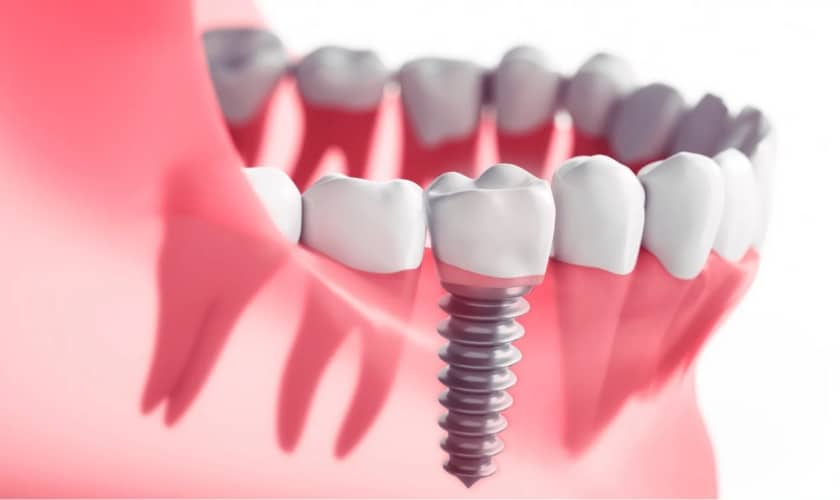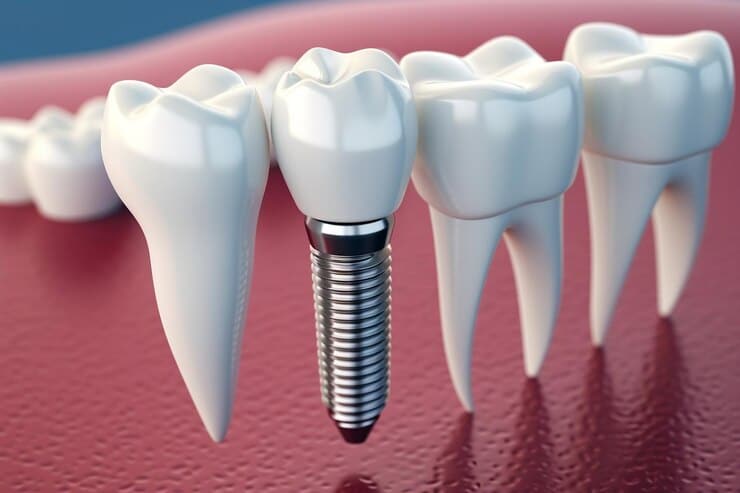
Are you missing teeth or tired of dealing with uncomfortable dentures? Dental implants may be the solution for you. These innovative devices offer a permanent, natural-looking replacement for missing teeth. But how do they work? In this article, we’ll explore the science behind dental implants and what makes them such an effective option for restoring your smile. Whether you’re considering getting a dental implant or simply curious about how they work, keep reading to learn more!
What is a Dental Implant?
A dental implant is a small, screw-like device that is inserted into the jawbone to replace missing teeth. It consists of three main components: the implant itself, an abutment that connects the implant to the replacement tooth or crown, and the prosthetic tooth or crown.
Dental implants are made from biocompatible materials such as titanium, which means they can fuse with your natural bone tissue over time through a process called osseointegration. This creates a stable foundation for your replacement teeth and helps prevent bone loss in your jaw.
Unlike traditional dentures or bridges, dental implants offer several advantages. They look and feel like natural teeth because they are securely anchored in place by the implant. They also allow you to chew normally without worrying about slippage or discomfort.
Dental implants are a safe and effective way to restore missing teeth and improve your oral health. With proper care, they can last many years and provide you with a confident smile for life!
How Dental Implants Work
Dental implants are an excellent solution for those who have lost teeth due to injury, decay or other reasons. But how exactly do dental implants work?
The process of getting a dental implant involves multiple steps. Firstly, the dentist will assess your jawbone and determine if it’s strong enough to support an implant. If not, they may recommend bone grafting before proceeding with the implant placement.
Once your jaw is ready, the dentist will surgically place a titanium post into your jawbone. This post acts as an artificial tooth root that fuses with the existing bone over time through a process called osseointegration.
After this healing period is complete, a connector piece known as an abutment is attached to the post. The final step involves placing a custom-made crown onto the abutment that looks and functions like a natural tooth.
Dental implants provide numerous benefits including improved speech and eating ability, enhanced oral health, and self-confidence. With proper care such as regular brushing and flossing, dental implants can last for many years or even decades!
Types of Dental Implants
There are various types of dental implants available to cater to different needs and preferences of patients. The most common type is the endosteal implant, which is placed directly into the jawbone through surgery. This type of implant provides a stable foundation for single or multiple replacement teeth.
Another type of dental implant is the subperiosteal implant, which sits on top of the jawbone rather than being inserted into it. It’s an ideal option for patients with insufficient bone density in their jaws and those who cannot undergo extensive surgery.
Zygomatic implants are an alternative solution for individuals with severe bone loss in their upper jaw. These longer implants anchor onto the cheekbones or zygoma instead of relying solely on the jawbone.
Mini dental implants have a smaller diameter compared to traditional implants and require less invasive procedures as they don’t need much space in the mouth. They’re commonly used when replacing small teeth such as incisors or premolars.
The choice between these types depends on several factors such as individual needs, budget constraints, oral health conditions, and dentist recommendations. Your dentist will help you determine which kind works best based on your specific situation.
What to Expect After Receiving a Dental Implant
After receiving a dental implant, patients can expect some discomfort and swelling in the treated area. This is normal and can be managed with over-the-counter pain medication.
It’s important to follow your dentist’s instructions for post-operative care to ensure proper healing of the implant. You may need to avoid certain foods or activities that could disrupt the implant site during the initial healing period.
During this time, it’s also important to maintain good oral hygiene habits, such as brushing and flossing regularly but being gentle around the treatment area. Your dentist may recommend special cleaning techniques or products to help keep the implant clean while it heals.
Over time, your jawbone will fuse with the dental implant through a process called osseointegration. This typically takes several months, during which you’ll have regular check-ups with your dentist to monitor progress and make any necessary adjustments.
Once fully healed and integrated into your jawbone, a dental implant functions just like a natural tooth – allowing you to eat, speak and smile with confidence!
Conclusion
Dental implants are a modern and innovative solution for missing teeth. They offer several benefits over traditional dentures or bridges, including increased stability, improved speech, and better oral health. As we have learned in this article, dental implants rely on the fusion of titanium posts with the jawbone to function as artificial tooth roots.
There are different types of dental implants available that can accommodate various needs and preferences. However, it is essential to consult with an experienced dentist to determine which type of implant best suits your situation.
While getting a dental implant may seem intimidating at first, rest assured that modern technology has made the procedure relatively quick and straightforward. With proper care and maintenance, your new dental implant can last you a lifetime.
If you’re looking for a long-term solution for missing teeth, consider consulting with your dentist about dental implants. It could be the perfect option to restore your smile back to its natural beauty!



